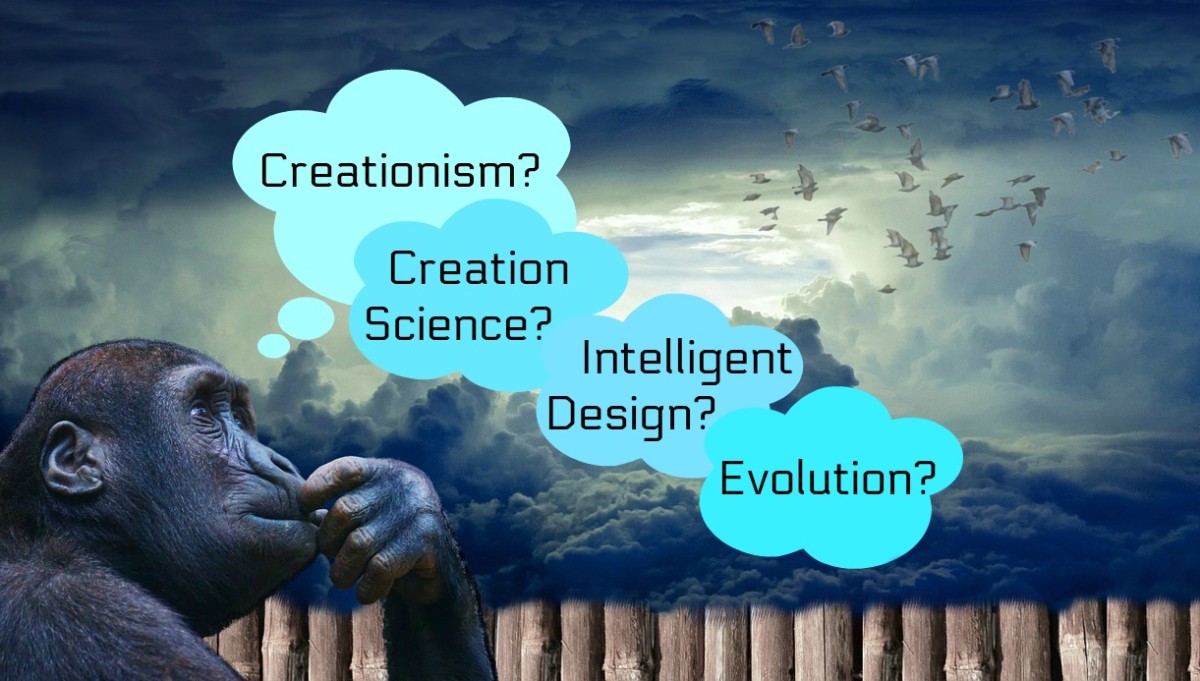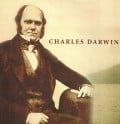Ten Points to Take Home from the Bill Nye and Ken Ham Debate
On February 4, 2014 at 7 pm EST inside the Creation Museum (Petersburg, KY), Bill Nye joined Ken Ham to debate, "Is creation a viable model of origins?"
If you have not already watched the debate, then I have provided the link above so that you may do so before commencing to read this article (otherwise, you'll likely encounter "spoilers" and not be able to understand the context). I realize that it can be a little difficult to get through all 2.5 hours of the debate in one sitting, so here's a drinking game for you: take a drink/shot every time Bill Nye says, "joy," and/or every time Ken Ham says, "assumptions." Just make sure the alcohol is weak, otherwise you'll be in trouble, fast!
What follows is the top 10 points that I feel need to be confronted, finalized, and re-iterated after watching the debate. If you would rather watch a video that summarizes these points, then you may scroll down to the YouTube video at the bottom of the page.
1. Ken Ham doesn't understand career specializations, only general titles.
In an effort to support his young-Earth creationist view, he essentially makes the claim that "doctors are doctors" and "scientists are scientists." He presents opinions (some in video form) from numerous (non-Evolutionary Biology) scientists and doctors that "don't believe" in Evolution. Using that logic, a person should be able to ask any M.D. (not just a neurosurgeon) to perform brain surgery (a notion that is, of course, ridiculous).
Ken Ham doesn't seem to realize that the inventor of the MRI scanner (an M.D.; Raymond Damadian), a Microbiologist (Andrew Fabich), an Astronomer (Danny Faulkner), and a Biomimetic Engineer (Stuart Burgess) don't necessarily have much education, training, or experience in Evolution/Genetics for their respective jobs. Please, do us all a favor and seek out actual Evolutionary Biologists or Geneticists for their "opinions" on Evolution. If everyone knows it is inappropriate to ask an Aircraft Engineer to repair a car engine, then how is it acceptable to ask a Pharmaceutical Chemist about Evolution?
That said, please keep in mind that those who choose to learn on their own are also capable of becoming very knowledgeable in a particular field. That's where Bill Nye comes into play. Sure, he "only" has a Bachelor of Science in Mechanical Engineering, but he really does know a good deal about all fields of Science, Evolution in particular (partially due to his passion for Science and his numerous public appearances). He has an excellent grasp of the various kinds of evidences for Evolution and wields them well in the debate.
Ken Ham Can't Comprehend Specific Career Choices
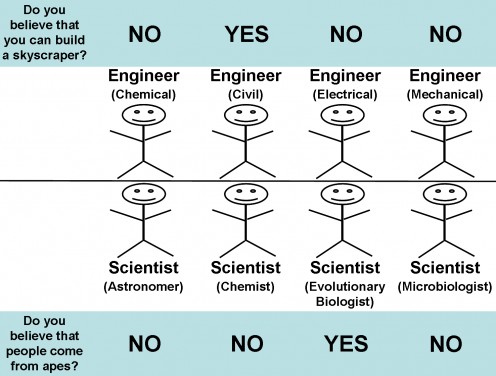
2. Contradicting yourself is not a good way to win a debate.
Does the available scientific evidence explain the Bible or does the Bible explain the scientific evidence? Which one are you trying to claim, Ken Ham? You can't have both because that creates a cyclical argument.
During his efforts to show how the Bible explains the available scientific evidence, he seems to conveniently forget how such a thing never worked in the past. Centuries ago, people used the Bible to suggest that the world was flat, that Earth was the center of the solar system, and that disease was something caused by God (not microbes).
He even goes on to claim that millions of people thinking a certain way doesn't make it "right," despite the fact that a major component of his argument is illustrating how many scientists are creationists. So, does the "perceived majority" matter, or not?
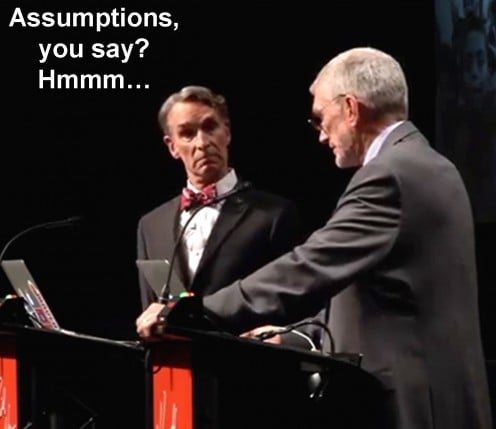
3. Assumptions for all!
You probably noticed that Ken Ham loves to bring up how many assumptions scientists make when doing Science. He likes to insinuate that certain equational constants (such as the speed of light, sediment deposition rate, tree growth rings, fossilization, radioactive decay, continental drift, and mutation rates) change over time, despite the fact that such evidence (ignoring the "constants" that are influenced by punctuated equilibrium) is nonexistent.
After making such "attacks" against scientists, Ken Ham goes right back to "assuming" that God directed people to write the contents of the Bible and that people accurately translated and reliably compiled the Bible. Hypocrisy much? Reliable assumptions are based on facts (Science), whereas unreliable assumptions are based upon hearsay and superstition (religion).
4. The Bible is useless for explaining/predicting Science.
Let's not forget that the Bible is a text written, edited, and compiled by men nearly two millennia ago. Its contents are perfectly in line with those facts. Anything beyond the reasonable conjecture of the men of that time is simply a result of modern-day interpretations of the text.
Clergy constantly change how they choose to interpret the Bible in order to keep pace with scientific discoveries. Just take a look at how Bible interpretations have changed from 500 B.C. to 2000 A.D. For example, the Bible "clearly stated" that Earth was the center of the solar system until about the 16th century A.D., when Galileo proved that the Sun was at the center (a blasphemous act which led to the Catholic Church suspecting him of heresy). Therefore, the Bible holds no real predictive or explanatory value regarding Science.
Biblical "Science" Timeline
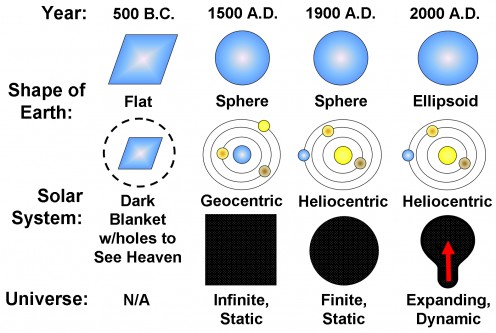
5. Natural laws never change...or do they?
In the beginning, there was nothing. BOOM! Then there was something. Having a rudimentary comprehension of quantum Physics is necessary to understand how something can come from "nothing" in the form of the Big Bang. Essentially, an equal amount of matter and anti-matter can randomly arise from "empty space," meaning that something really can come from "nothing."
Even though it is possible that macroscopic laws came into being right after the Big Bang, it is likely that since quantum laws existed in the beginning (making the Big Bang possible), all macroscopic laws also already existed.
Since then, we haven't found evidence that any of these "laws of nature" have changed. This applies to things like the law of gravity, speed of light, and radioactive decay (to name just a few). If you'd like to provide evidence to the contrary, then please publish it!
Ken Ham seems to think that if a tree falls in a forest and nobody is around to see it, then there is no way to prove that the tree fell as opposed to God placing it there. I don't see how he could stand to watch CSI, which uses "flawed" historical Science (relying on the constancy of natural laws) to solve murder cases.
Take this classic philosophical argument, for instance: what if you were "created" two minutes ago and all of your memories were just implanted there by your Creator? How could you tell the difference? This scenario seems ridiculous because there is no evidence for a supernatural Creator capable of such a task.
6. Observational Science confirms historical Science.
That is why the perception of these two "kinds" of Science is sort of a misnomer. They both utilize a process of logical reasoning based on factual evidence to arrive at a conclusion. Even though we weren't around to witness the birth of the Sun, we can observe stars of similar size/composition in the universe and calculate how old the Sun is and how much longer it is going to burn before dying.
Similarly, we can observe preserved animals in different layers of the fossil record and use DNA from living animal relatives to confirm those phylogenetic relationships (using the same methods that determine your parental heritage), supporting the Theory of Evolution. Evolution gives us the ability to conclude that all life on this planet originated from a single, common ancestor that came about by a purely random process called Abiogenesis. Observing the random occurrence of self-assembling molecules in a lab confirms this notion.
E. coli Citrate Evolution
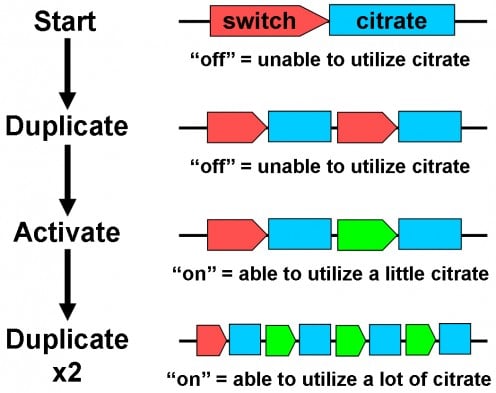
7. Turning genes "on" and "off" is Evolution.
Ken Ham prided himself on interviewing a Microbiologist (Andrew Fabich) to downplay the importance of the study (Blount et al., 2012) that followed a population of E. coli over 20 years (>40,000 generations). Some of these bacterial populations evolved the ability to utilize citrate as a substrate by a series of purely random mutations.
These mutations involved duplicating the inactive citrate fermentation gene, then activating the genes of the duplicated region by merging it with a promoter, and finally duplicating the now active citrate fermentation gene numerous times in order to enhance its expression (thus enabling the utilization of large amounts of citrate substrate by those bacteria).
This process of duplicating a gene and changing it is called neo-functionalization. It is just one of the many routes that evolution can take in order to create new species. Microbiologists generally understand this process, but since they never see bacteria "evolving" into anything that is not another bacterium, their opinions on "macro-Evolution" are typically flawed.
The ones that really comprehend this process typically have some experience/training in Population Genetics (at the macroscopic scale), which explores how genetic mechanisms operate on large scales over time to generate new species. Therefore, take the process that occurred in E. coli over a "measly" 20 years to create a single "novel" function and project it out another billion years (the approximate time it took for eukaryotes to evolve from prokaryotes) to see what you get.
8. Consciousness is insignificant.
As much as we humans love to think that we are so much "better" than other lifeforms, the truth is that we are just another shade of color in the spectrum of life. Consciousness is a by-product of intelligence, nothing more. It's not some "magical" ability granted to humans by a supernatural Creator, since many other creatures (octopuses, birds, dogs, dolphins, monkeys, etc.) have varying levels of consciousness (directly correlated with their intelligence).
9. True scientists are flexible.
Just to re-iterate one of Bill Nye's points, real scientists go where the evidence points and don't partake in being loyal or "having faith" without evidence. For example, I was brought up learning about how venomous snakes (rattlesnakes in particular) are the pinnacle of snake evolution.
Research from the past decade, however, is increasingly indicating that venom is actually the ancestral condition of snakes, with constriction being the derived means of acquiring prey (since pythons have much higher mutation rates). Further evidence for this comes from the fact that most snakes and even a few lizards (including the Komodo Dragon) produce some sort of venom (even if the components are weak/inactive and produced in low quantities), implying that snakes likely evolved from venomous lizards.
Progress can only occur once scientists are true to their trade: seeking the truth through factual evidence. It is the consensus of the scientific community that dictates the "gaps" that religions can fill with their indoctrination.
No Science Education = Empty Classrooms

10. Teaching kids the "right" way to think.
Ken Ham wishes to corrupt the nation's youth with delusions brought about by an ancient text. He wants to keep them from questioning the Bible's "infallible" teachings by embracing the Dark Ages. As Bill Nye said, teaching Creationism in a Science classroom will do nothing but hinder the United States technologically and economically.
Being a teacher, myself, I feel that I have a grasp of how to teach kids the "right" way to think:
- Never stop asking questions.
- Don't "believe" something without factual evidence.
- If you ever "doubt" a hypothesis or theory, then gather some evidence and try to disprove it.
Those three simple things will instill children with a desire to seek knowledge and critically evaluate everything, leading to a generation of citizen scientists. Having an intelligent, informed populace can only benefit human society and the environment. Don't let the Bible think for you...you're better than that!
Video Summary of These 10 Points from the Debate
Disclaimer
All pictures and videos, unless specifically noted otherwise, are my property and may not be used in any form, to any degree, without my express permission (please send email inquiries to christopher.j.rex@gmail.com).
I wholly believe feedback can be a useful tool for helping make the world a better place, so I welcome any (positive or negative) that you might feel compelled to offer. But, before actually leaving feedback, please consider the following two points: 1. Please mention in your positive comments what you thought was done well, and mention in your negative comments how the article can be altered to better suit your needs/expectations; 2. If you believe that any of the information contained in this article is lacking sufficient detail or is incorrect, then please leave a detailed comment addressing the issue and citing your sources (if applicable).
Thank you for reading!
© 2014 Christopher Rex




